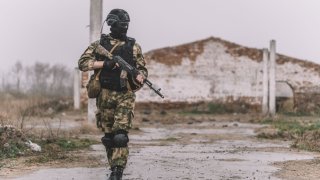Russian Caution Should Be a Lesson
Russia’s own meekness has betrayed either Putin’s blood-crazed focus solely on Ukraine or Moscow’s unwillingness to contest a war with NATO seriously.
Much can be said about redlines and the cost of leaving their crossing unpunished. Depending on whom you ask, President Obama’s redline on the Assad regime’s use of chemical weapons in the Syrian civil war was either a horribly foolish utterance or the failure to enforce it was a strategically and morally deficient policy. It can be argued that it was both. It’s hard to say U.S. credibility has not taken blows since Crimea, Syria, or Afghanistan. The path to recovery or further stumbling is upon us. Washington can now show that Putin is a blusterer who runs to the threat of world war at inconvenience but backs away from resolute foes. Reassuring a less restrained Ukraine carries as well. NATO allies that border Russia have less reason to fear limits on their own defense.
Mr. Clarke and Mr. Beardsley are correct in arguing that unwanted, unnecessary escalation with a nuclear-armed tyrant should be avoided. However, their concerns about escalation are drawn from an inaccurate analysis of the situation. Russia’s own meekness has betrayed either Putin’s blood-crazed focus solely on Ukraine or Moscow’s unwillingness to contest a war with NATO seriously. Russian threats have proven empty. Moscow keeps issuing them only because the West keeps caving without cause.
The nature of the Russo-Ukrainian War and any NATO non-combat involvement needs to be understood in much less drastic concerns than ahistorical allusions to the 1950s and 1960s. The dismissive critique that new, more effective policies won’t have any effect has already been proven wrong, and such an argument was so contrary to theories of military science that it hampers the theoretically grounded arguments—even if the fact pattern betrayed them as well.
Michael C. DiCianna is a visiting fellow at the Transatlantic Dialogue Center and a research assistant at the Yorktown Institute, as well as a contributor to the Center for European Policy Analysis journal Europe’s Edge. He has worked as a consultant in the U.S. intelligence community for several years, focusing on military affairs in Eastern Europe, Central Asia, and the Middle East. Follow him on LinkedIn and on X.
Image: Melnikov Dmitriy / Shutterstock.com.

